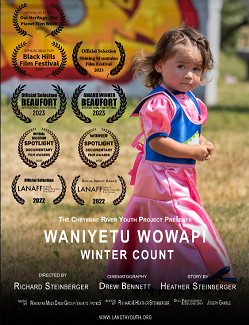
- Details
- By Native News Online Staff
The Cheyenne River Youth Project’s (CRYP) award-winning documentary film, titled “Waniyetu Wowapi (Winter Count),” will be an official selection at the 5th annual Shining Mountains Film Festival in Aspen, Colorado next month. Scheduled for Dec. 1-2, the festival is designed to highlight Native voices, causes and life ways.
Waniyetu Wowapi (Winter Count) will appear in the Program 2 film block on Saturday, Dec. 2, which takes place from 2 to 4:30 p.m. All films will be screened at the historic Wheeler Opera House in Aspen.
CRYP commissioned the film project in 2021, with primary filming taking place during the RedCan invitational graffiti jam that July. The documentary debuted in 2022 and, surprising filmmakers and CRYP staff alike, was accepted into multiple film festivals across the country.
“The film originally was intended to share our CRYP story through the lens of RedCan,” explained Julie Garreau, CRYP’s executive director. “As the project moved forward, however, we realized the story was so much bigger than that. It was about the transformative, healing power of art in a Native community.
“The film brings viewers into the heart of our circle here on the Cheyenne River reservation,” she continued. “It allows people who have never experienced Lakota culture or visited an indigenous community to meet our kids, parents and elders, as well as the artists and partners across the country who have become part of our family.”
To date, Waniyetu Wowapi (Winter Count has appeared in the 2022 Latino & Native American Film Festival, where it won a Social Impact Award; 2022 Documentary Film Awards, where it won a Gold Award; 2023 Beaufort International Film Festival, where it won the Susan A.K. Shaffer Humanitarian Award; 2023 Black Hills Film Festival; and 2023 Our Heritage, Our Planet Film Week. The Shining Mountains Film Festival will be its sixth appearance on the film festival circuit.
“We never expected that,” Garreau said. “The response to the film has simply blown us away. We’re humbled and honored that our story has resonated with audiences in so many different places.”
The Shining Mountains Film Festival is sponsored by the Aspen Indigenous Foundation, which began its life in 2005 as the Aspen Ute Foundation. Founder and Executive Director Deanne Vitrac-Kessler met Northern Ute elder Loya Arrum-Cesspooch that year; at his request and with his support, she started the foundation to bring the indigenous presence back to the Roaring Fork Valley and help facilitate the reconnection of the Utes to their ancestral lands.
Over the years, the foundation has developed more inclusive, broader programs that welcome and involve all Native tribes. It officially changed its name in 2020.
Garreau and Waniyetu Wowapi (Winter Count) filmmakers Richard Steinberger and Joseph Gamble will attend the 2023 Shining Mountains Film Festival, where they have been invited to participate in a Q&A session following the screening of the film.
To see the film schedule and learn more about the official selections, visit shiningmountainsfilm.com. All-access festival passes and tickets for individual film blocks are available through the website.
Those unable to attend can view the film at vimeo.com/lakotayouth.
More Stories Like This
A Native American Heritage Month Playlist You Can Listen to All Year Long11 Native Actors You Should Know
Five Native American Films You Should Watch This Thanksgiving Weekend
Heavy metal is healing teens on the Blackfeet Nation
Over 150 Tribal Museums Participate in Fourth Annual Celebration of Native Life
Help us tell the stories that could save Native languages and food traditions
At a critical moment for Indian Country, Native News Online is embarking on our most ambitious reporting project yet: "Cultivating Culture," a three-year investigation into two forces shaping Native community survival—food sovereignty and language revitalization.
The devastating impact of COVID-19 accelerated the loss of Native elders and with them, irreplaceable cultural knowledge. Yet across tribal communities, innovative leaders are fighting back, reclaiming traditional food systems and breathing new life into Native languages. These aren't just cultural preservation efforts—they're powerful pathways to community health, healing, and resilience.
Our dedicated reporting team will spend three years documenting these stories through on-the-ground reporting in 18 tribal communities, producing over 200 in-depth stories, 18 podcast episodes, and multimedia content that amplifies Indigenous voices. We'll show policymakers, funders, and allies how cultural restoration directly impacts physical and mental wellness while celebrating successful models of sovereignty and self-determination.
This isn't corporate media parachuting into Indian Country for a quick story. This is sustained, relationship-based journalism by Native reporters who understand these communities. It's "Warrior Journalism"—fearless reporting that serves the 5.5 million readers who depend on us for news that mainstream media often ignores.
We need your help right now. While we've secured partial funding, we're still $450,000 short of our three-year budget. Our immediate goal is $25,000 this month to keep this critical work moving forward—funding reporter salaries, travel to remote communities, photography, and the deep reporting these stories deserve.
Every dollar directly supports Indigenous journalists telling Indigenous stories. Whether it's $5 or $50, your contribution ensures these vital narratives of resilience, innovation, and hope don't disappear into silence.
 The stakes couldn't be higher. Native languages are being lost at an alarming rate. Food insecurity plagues many tribal communities. But solutions are emerging, and these stories need to be told.
The stakes couldn't be higher. Native languages are being lost at an alarming rate. Food insecurity plagues many tribal communities. But solutions are emerging, and these stories need to be told.
Support independent Native journalism. Fund the stories that matter.
Levi Rickert (Potawatomi), Editor & Publisher

